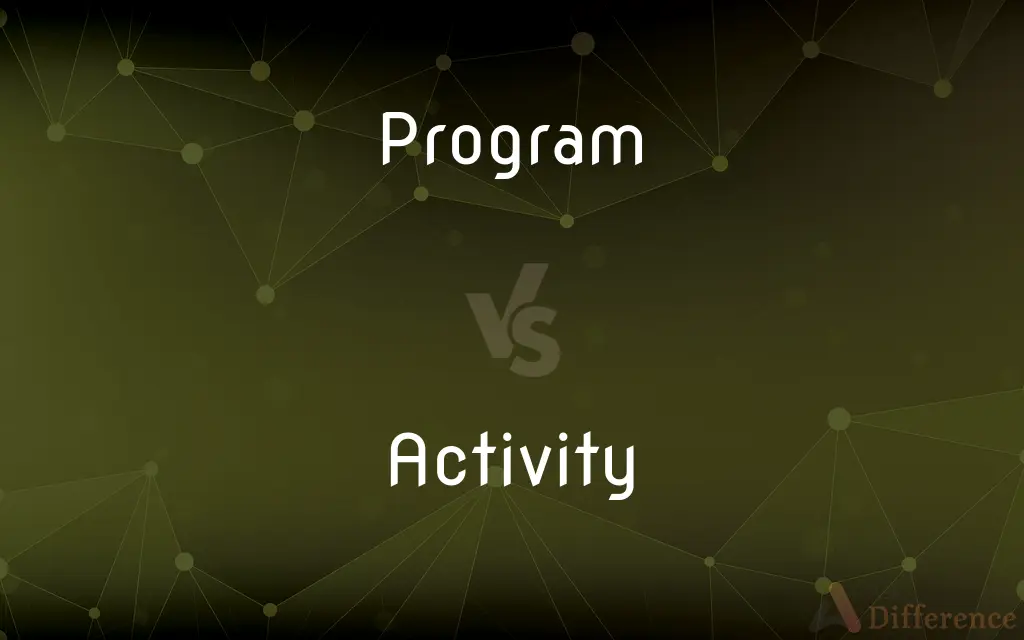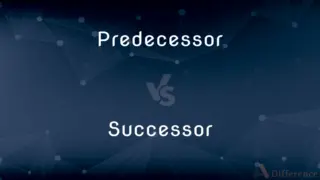Program vs. Activity — What's the Difference?
By Urooj Arif & Fiza Rafique — Updated on February 28, 2024
"Program" refers to a planned series of activities designed to achieve specific goals, often structured and time-bound. "Activity" is a single task or action, usually part of a broader program or routine.

Difference Between Program and Activity
Table of Contents
ADVERTISEMENT
Key Differences
A program is a comprehensive plan that encompasses multiple activities or events aimed at reaching a specific outcome or fulfilling a set of objectives, e.g., "The fitness program includes various activities like running, swimming, and weight training." An activity, on the other hand, is an individual task or engagement within a program or daily routine, e.g., "Swimming is an activity that improves cardiovascular health."
Programs represents a broader strategy or initiative, often with a defined timeline and structured components designed to achieve targeted results. Activities are the building blocks of a program, each contributing to the overall goal but capable of being a standalone action with its own immediate purpose.
Programs are generally more comprehensive, requiring planning and coordination to encompass various activities toward a larger goal, activities are more focused, often representing a single step or component within the broader framework of a program.
Programs are typically associated with organized efforts and structured plans, such as educational curricula, training regimens, or project outlines, requiring management and oversight. Activities can be informal and varied, ranging from leisure pursuits to specific tasks in a work or personal context.
Understanding the distinction between a program and an activity is crucial for effective planning and execution in various fields, from education and business to personal development and leisure, ensuring clarity in objectives and methods.
ADVERTISEMENT
Comparison Chart
Definition
A structured series of activities aimed at achieving specific objectives.
A single task or engagement, often part of a larger program.
Scope
Broad, encompassing multiple components or steps.
Narrow, focused on a specific task or engagement.
Purpose
To achieve a larger goal or set of outcomes through coordinated efforts.
To accomplish a particular task or to provide engagement in itself.
Duration
Typically has a defined timeline, ranging from short-term to long-term.
Can be a one-time task or a recurring event, but individually shorter in duration.
Management
Requires planning, coordination, and oversight to ensure objectives are met.
May require minimal planning, focused on execution of the task.
Compare with Definitions
Program
A software application.
This computer program simplifies data analysis.
Activity
A leisure pursuit.
Painting is a relaxing activity for weekends.
Program
A government initiative.
The recycling program aims to reduce waste.
Activity
A classroom task.
Today's activity involves a group discussion.
Program
A project plan.
The construction program outlines all phases of development.
Activity
A software function.
This app's activity log tracks usage patterns.
Program
A fitness regimen.
Her fitness program combines cardio and strength training.
Activity
A work assignment.
Completing the report is today's main activity.
Program
A series of educational courses.
The university's engineering program covers various disciplines.
Activity
A process existing in or produced by nature (rather than by the intent of human beings);
The action of natural forces
Volcanic activity
Program
An ordered list of events to take place or procedures to be followed; a schedule
A program of physical therapy for a convalescent.
Activity
The trait of being active; moving or acting rapidly and energetically;
The level of activity declines with age
Program
A plan or system of academic and related or ancillary activities
A work-study program.
Activity
A specific exercise.
Jogging is her preferred morning activity.
Program
A set of structured activities.
Our program for today’s exercise class includes swimming and jogging.
Program
A system of projects or services intended to meet a public need;
He proposed an elaborate program of public works
Working mothers rely on the day care program
Program
(computer science) a sequence of instructions that a computer can interpret and execute;
The program required several hundred lines of code
Program
A radio or television show;
Did you see his program last night?
Program
A performance (or series of performances) at a public presentation;
The program lasted more than two hours
Program
An announcement of the events that will occur as part of a theatrical or sporting event;
You can't tell the players without a program
Program
Arrange a program of or for;
Program the 80th birthday party
Program
Write a computer program
Common Curiosities
How does the success of a program relate to its activities?
The success of a program depends on the effective planning and execution of its constituent activities.
Can an activity exist outside of a program?
Yes, activities can stand alone or be part of a broader program.
Can the terms "program" and "activity" be interchangeable?
No, due to their different scopes and purposes, the terms are not interchangeable.
Can a program include other programs?
Yes, larger programs can encompass smaller programs or subprograms, each with its own set of activities.
How do you measure the effectiveness of a program versus an activity?
Program effectiveness is measured by overall goal achievement, while activity effectiveness is assessed by the completion and success of the specific task.
Are all programs made up of activities?
Yes, programs are generally composed of various activities structured to achieve the program's objectives.
Can a simple task evolve into a program?
Yes, a simple task can grow into a program if it expands to include multiple related activities aimed at a larger goal.
How is the management of programs different from activities?
Managing a program involves overseeing its overall structure, timeline, and objectives, while managing an activity focuses on executing a specific task.
Is a program always more complex than an activity?
Generally, yes, as programs involve coordination of multiple activities toward a broader objective.
What is the difference between a program and an activity?
A program is a structured plan with multiple activities to achieve specific goals, while an activity is an individual task or engagement.
What role do activities play in achieving a program’s goals?
Activities are the operational steps or tasks that, when successfully completed, collectively achieve the program’s goals.
What is an example of converting an activity into a program?
An individual workout can evolve into a comprehensive fitness program by adding various exercises and structuring them over time to achieve fitness goals.
How do professionals use the understanding of programs and activities?
Professionals use this distinction to organize, plan, and execute strategies in business, education, project management, and personal development.
Can the failure of an activity jeopardize a whole program?
Depending on the activity's importance, its failure can impact the program's success, highlighting the need for effective planning and risk management.
What impacts do programs and activities have on organizational goals?
Programs align with and drive towards strategic organizational goals, while activities contribute to these goals through specific, actionable tasks.
Share Your Discovery

Previous Comparison
Furtherly vs. Further
Next Comparison
Predecessor vs. SuccessorAuthor Spotlight
Written by
Urooj ArifUrooj is a skilled content writer at Ask Difference, known for her exceptional ability to simplify complex topics into engaging and informative content. With a passion for research and a flair for clear, concise writing, she consistently delivers articles that resonate with our diverse audience.
Co-written by
Fiza RafiqueFiza Rafique is a skilled content writer at AskDifference.com, where she meticulously refines and enhances written pieces. Drawing from her vast editorial expertise, Fiza ensures clarity, accuracy, and precision in every article. Passionate about language, she continually seeks to elevate the quality of content for readers worldwide.














































